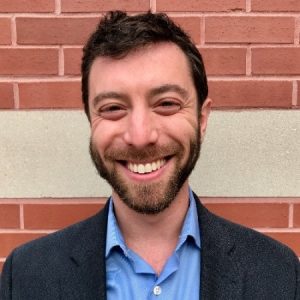Takeaway
Placing my child’s and my patients’ needs before my own gives me purpose. These responsibilities help mitigate burnout and allow me to give excellent care.

Lifelong Learning in Clinical Excellence | February 24, 2022 | 3 min read
By Ben Roberts, CRNP, AGACNP-BC, ACHPN, Johns Hopkins Medicine
We’re refeaturing this piece in honor of National Nurses Week 2024.
Two weeks after I was certified as a nurse practitioner, I became a father, certifiably. On a cool summer’s night, my wife gave birth to a stunning, ebullient boy, and my life instantly expanded. The weeks that followed, at home with our transforming family, contained multitudes: patience and frustration; elation and despair; vitality and exhaustion; each in extreme and often simultaneous doses.
Upon returning to work on our palliative care team, I was both a new dad and a freshly minted provider. The four months since have revealed key similarities between these roles.
1. Algorithms help, but not always.
I was astonished that my newborn’s cries were virtually indistinguishable despite alerting us to vastly different needs. I remember reading tens of blogs that said, “Maybe it’s a single hair wrapped around a little toe!” like it was just adorable to spend all night changing, feeding, and rocking our wailing baby to no avail, only to discover his toe needed to be amputated.
So how to know what to fix, when? As an acute care NP, I would be lost without ACLS during a code; but in palliative care, algorithms don’t allow for the flexibility required during goals of care discussions. The process for differentiating a diagnosis for my baby or my patient lies somewhere in between: it’s helpful to have a road map, but critical to know when to let it go. One heuristic did turn out to be consistently reliable with my newborn: “Step 1: Check diaper.”
2. Non-verbal communication is key.
All this undifferentiated crying rocked me to my core. I became a laughingstock for my more intuitive wife, as I begged my infant to, “Just tell me what you want! Use your words!” For the first six weeks, guessing my son’s needs was nearly as reliable as assessing them. Now at six months, I can recognize his astonishing nonverbal skills. An eyebrow up, a subtle glance, narrowed lips, fingers flexed, a change in posture, and infinite tones and babbles all contain worlds of meaning. (Still, the diaper heuristic remains useful).
When I work with nonverbal patients, whether organically altered or intubated and sedated, symptom assessment relies on objective cues. And with verbal patients and family members, the linguistic content of any question, concern, or complaint is situated within a richer context. Their tone, body language, and life story inform the meaning of their words.
3. Not all suffering must be fixed right now.
It’s hard work to maintain emotional boundaries in healthcare, and this is a key contributor to burnout. It’s challenging to feel empathy for a person who’s suffering and then simply abide, neither pushing away hard feelings nor clinging to the awfulness of it all. As a father, I’m coming to understand there are aches, pains, and discomforts that can be ameliorated, and those that cannot–at least, not in this moment, and not by me alone.
Being unable to rid my son and patients of their suffering doesn’t make me a bad parent or clinician. To the contrary, recognizing where I’m limited in my ability to “fix” them can make space for their emotions to run a natural course, create room for others’ input, and allow me to return to their care refreshed. If my focus is solely on the end-goal of relief, I avoid the painful experience of bearing witness to distress, and distance myself from my son and patients in their moment of suffering.
Being a new provider for my family and my palliative care team has been enlivening, but the responsibilities can stretch me thin. I try to remind myself that I’m privileged to step outside my own immediate wants to care for others, ultimately grounding me and providing energy and direction towards my deeper values. This symbiosis is, I think, the greatest similarity between my new roles. Now I just have to remember to eat and sleep.
This piece expresses the views solely of the author. It does not necessarily represent the views of any organization, including Johns Hopkins Medicine.

